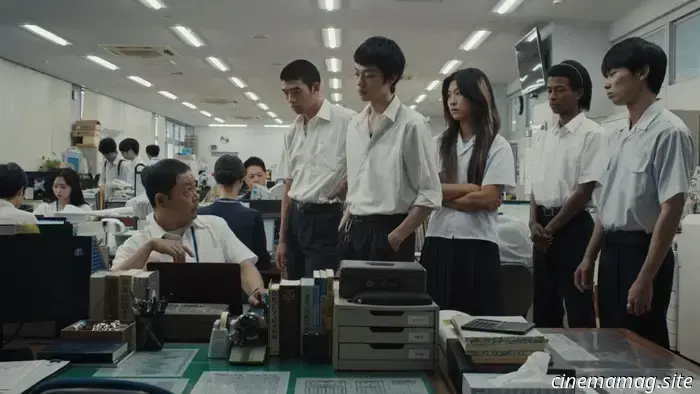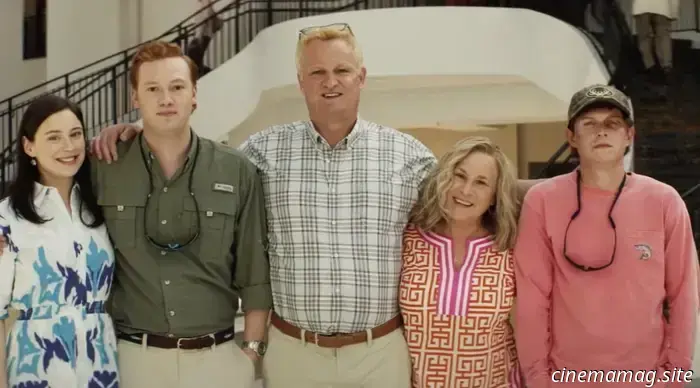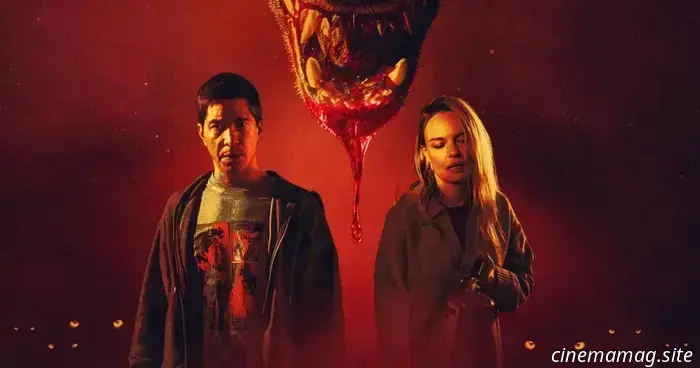
Happyend Review: Neo Sora Insightfully Examines Our Reactions to an Approaching Future
Note: This review was initially published as part of our 2024 Venice coverage. Happyend opens in theaters on September 12.
“Something significant is about to change” serves as an ominous opening line for a debut fiction feature, yet director Neo Sora expertly navigates the delicate balance between expectation and inevitability. Set in the near future, Happyend transforms Tokyo into a sprawling playground for high school seniors, centered around childhood friends Yuta (Hayato Kurihara) and Kou (Yukito Hidaka). Their lives are flourishing, and the future seems promising for these teenagers, despite the city's persistent preparations for a catastrophic earthquake. Daily drills and false alarms disrupt an otherwise seamless routine, where Yuta and Kou gather their classmates at their Music Research Club—an extracurricular activity more for enjoyment than practical purposes. With a well-equipped classroom available at all times, their group can create a secure microcosm where they share a love for electronic avant-garde music and have fun.
However, Happyend is far from a simplistic film; its energy and vibrancy arise from a talented ensemble of young actors, further enhanced by an outstanding score from Brooklyn-based composer Lia Ouyang Rusli. Music plays a crucial part in this film, and those familiar with the documentary Ryuichi Sakamoto: Opus—which premiered at the Lido just last year and revolves around the last concert of Sora's late father—will not be surprised to discover the deep emotional resonance echoed in Happyend’s sound. The 33-year-old's second feature also made its world premiere at Venice, in the Horizons section, and is already poised to screen at Toronto, Busan, and the New York Film Festival—anticipate hearing more about this film for some time.
Sora depicts this near-future Tokyo against the backdrop of current socio-political concerns—nationalism, xenophobia, surveillance, compliance—and the characters of Happyend regularly face these discriminatory issues, especially in school. After executing a harmless yet inventive prank on the principal, they and their peers must adapt to the new reality imposed by a sophisticated surveillance system whimsically named “Panopty.” Just as school authorities leverage this incident to tighten their control, the government exploits the impending earthquake threat to enact an emergency decree that infringes on personal lives. It can be viewed through a Foucauldian lens or as “the state of exception” according to Giorgio Agamben—and it's fitting; Sora, a Philosophy graduate, seamlessly weaves these concepts into his narrative. Notably, the film's biopolitical themes never overshadow the poignant humanistic focus that permeates every frame.
Cinematographer Bill Kirstein (who, in addition to Opus, also collaborated on Jessica Dunn Rovinelli’s stunning So Pretty) creates symphonies from sharp, layered visuals. The images appear immaculate due to their intricate geometry, yet they possess a depth that defies flatness; Kirstein’s long takes are distinct, allowing the emotional richness to gradually intertwine with the frame's structured compositions, much like ivy climbing. Presenting a sensual glimpse of a sterile future, Happyend retains its political edge without sacrificing form; the more at ease we become while observing this world, the more radical it reveals itself.
Yuta and Kou eventually diverge in their paths, at least metaphorically: Kou becomes increasingly politically vocal while Yuta remains ensconced in his apolitical bubble. Through these characters, the film explores rebellion's significance and how individuals relate to rules—whether adhering to them or breaking them—as control escalates in the name of security. The motto “The children, they must feel safe!” resonates throughout, yet no one inquires whether the children actually want to be saved. In this context, Sora's script also examines the conflicted attitudes older generations adopt towards the younger ones, blending condescension with concern. Similarly, Happyend delineates two responses to an increasingly grim future: one is abdication, and the other is resistance. However, the distinction between these responses is not straightforward, and Neo Sora infuses the film with uncertainty, hesitance, and hope in equal measure.
Happyend had its premiere at the Venice Film Festival.
Other articles
 Hulu has released a trailer for "Murdaugh: Death in the Family," featuring Patricia Arquette and Jason Clarke.
Hulu has unveiled a poster and trailer for the upcoming crime drama series Murdaugh: Death in the Family, set to debut this October. Drawing inspiration from the Murdaugh Murders podcast and real-life shocking occurrences, the series narrates the tale of the influential Murdaugh family from South Carolina, highlighting their links to various mysterious deaths and cover-ups.
Hulu has released a trailer for "Murdaugh: Death in the Family," featuring Patricia Arquette and Jason Clarke.
Hulu has unveiled a poster and trailer for the upcoming crime drama series Murdaugh: Death in the Family, set to debut this October. Drawing inspiration from the Murdaugh Murders podcast and real-life shocking occurrences, the series narrates the tale of the influential Murdaugh family from South Carolina, highlighting their links to various mysterious deaths and cover-ups.
 Apex Legends: Showdown scheduled for the mid-season update.
Respawn Entertainment has disclosed new information regarding features that will be introduced in Apex Legends: Showdown with the mid-season update and the upcoming Wild Iron event. This event, scheduled from September 16th to October 14th, will introduce a new weapon, an abundance of loot, and additional content. Check out the new trailer for the Wild Iron event […]
Apex Legends: Showdown scheduled for the mid-season update.
Respawn Entertainment has disclosed new information regarding features that will be introduced in Apex Legends: Showdown with the mid-season update and the upcoming Wild Iron event. This event, scheduled from September 16th to October 14th, will introduce a new weapon, an abundance of loot, and additional content. Check out the new trailer for the Wild Iron event […]
 How Alternatives to Omegle and Live Streaming Platforms Function
Explore the technology that powers omegle alternatives and live streaming services, focusing on video protocols, security measures, and smooth user experiences.
How Alternatives to Omegle and Live Streaming Platforms Function
Explore the technology that powers omegle alternatives and live streaming services, focusing on video protocols, security measures, and smooth user experiences.
 The trailer for the horror-comedy Coyotes features Kate Bosworth and Justin Long as the main attractions.
Aura Entertainment has released a poster and trailer for the horror-comedy Coyotes, directed by Colin Minihan (Grave Encounters, Extraterrestrial), in anticipation of its world premiere at Fantastic Fest later this month. The movie focuses on a family that finds themselves confined in their Hollywood Hills home when a fierce wildfire ensnares them, and a [...]
The trailer for the horror-comedy Coyotes features Kate Bosworth and Justin Long as the main attractions.
Aura Entertainment has released a poster and trailer for the horror-comedy Coyotes, directed by Colin Minihan (Grave Encounters, Extraterrestrial), in anticipation of its world premiere at Fantastic Fest later this month. The movie focuses on a family that finds themselves confined in their Hollywood Hills home when a fierce wildfire ensnares them, and a [...]
Happyend Review: Neo Sora Insightfully Examines Our Reactions to an Approaching Future
Note: This review was initially published during our coverage of the 2024 Venice Film Festival. Happyend is set to premiere in theaters on September 12. “Something significant is on the verge of changing” serves as a particularly foreboding opening line for a first fictional feature. However, director Neo Sora expertly manages the delicate equilibrium between suspense and predictability. The narrative unfolds in
